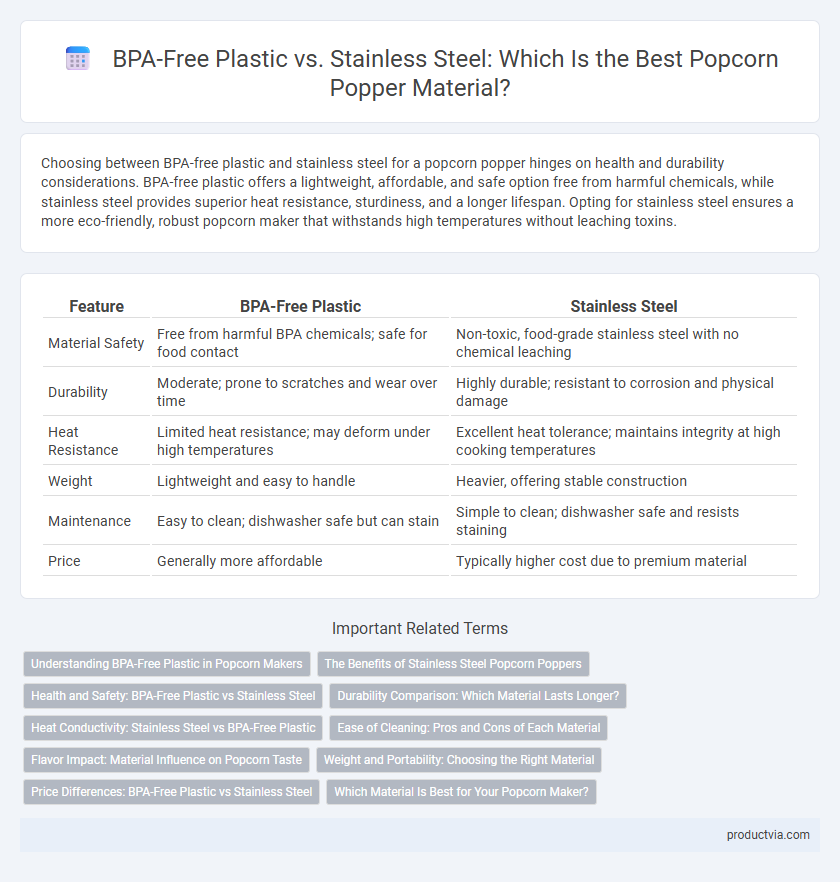Choosing between BPA-free plastic and stainless steel for a popcorn popper hinges on health and durability considerations. BPA-free plastic offers a lightweight, affordable, and safe option free from harmful chemicals, while stainless steel provides superior heat resistance, sturdiness, and a longer lifespan. Opting for stainless steel ensures a more eco-friendly, robust popcorn maker that withstands high temperatures without leaching toxins.
Table of Comparison
| Feature | BPA-Free Plastic | Stainless Steel |
|---|---|---|
| Material Safety | Free from harmful BPA chemicals; safe for food contact | Non-toxic, food-grade stainless steel with no chemical leaching |
| Durability | Moderate; prone to scratches and wear over time | Highly durable; resistant to corrosion and physical damage |
| Heat Resistance | Limited heat resistance; may deform under high temperatures | Excellent heat tolerance; maintains integrity at high cooking temperatures |
| Weight | Lightweight and easy to handle | Heavier, offering stable construction |
| Maintenance | Easy to clean; dishwasher safe but can stain | Simple to clean; dishwasher safe and resists staining |
| Price | Generally more affordable | Typically higher cost due to premium material |
Understanding BPA-Free Plastic in Popcorn Makers
BPA-free plastic in popcorn makers ensures the absence of bisphenol A, a chemical linked to health risks, making it a safer option for food contact materials. This material is lightweight, heat-resistant, and often more affordable than stainless steel, providing convenience without compromising safety. Understanding BPA-free plastic helps consumers make informed choices about durability, safety, and maintenance when selecting a popcorn popper.
The Benefits of Stainless Steel Popcorn Poppers
Stainless steel popcorn poppers offer superior durability and heat resistance compared to BPA-free plastic, ensuring safe and long-lasting use without the risk of chemical leaching. Their non-porous surface resists odors and stains, maintaining popcorn's fresh flavor while providing easy cleaning. The robust construction of stainless steel models often leads to more even heat distribution, enhancing popping efficiency and reducing burnt kernels.
Health and Safety: BPA-Free Plastic vs Stainless Steel
BPA-free plastic popcorn makers eliminate the risk of harmful chemical leaching, ensuring a safer option for food preparation compared to traditional plastics. Stainless steel popcorn poppers offer durability and non-reactive surfaces that resist staining and corrosion while maintaining food safety standards. Choosing BPA-free plastic or stainless steel prioritizes health by reducing exposure to toxins commonly found in low-quality materials.
Durability Comparison: Which Material Lasts Longer?
Stainless steel popcorn poppers are significantly more durable than BPA-free plastic counterparts due to their resistance to wear, heat, and impact. BPA-free plastic may degrade over time with frequent use and exposure to high temperatures, leading to cracks or discoloration. Investing in stainless steel ensures longevity and consistent performance in popcorn making.
Heat Conductivity: Stainless Steel vs BPA-Free Plastic
Stainless steel's superior heat conductivity ensures even and efficient heating in popcorn poppers, leading to consistently well-popped kernels without burning. BPA-free plastic, while safer for food contact due to the absence of harmful chemicals, typically has lower thermal conductivity, causing slower and less uniform heat distribution. Choosing stainless steel enhances popcorn quality and cooking speed, whereas BPA-free plastic prioritizes chemical safety but may compromise on performance.
Ease of Cleaning: Pros and Cons of Each Material
Stainless steel popcorn poppers offer superior ease of cleaning due to their smooth, non-porous surface that resists stains and odors, making them dishwasher-safe and durable over time. BPA-free plastic poppers are lightweight and less prone to heat retention but can absorb oils and odors, often requiring more thorough manual cleaning to avoid residue buildup. Choosing stainless steel enhances long-term maintenance, while BPA-free plastic provides convenience for occasional use with careful cleaning.
Flavor Impact: Material Influence on Popcorn Taste
Stainless steel popcorn poppers preserve the pure, natural flavor of popcorn by resisting odor absorption and preventing any chemical taste transfer. BPA-free plastic offers the advantage of lightweight design but may subtly affect flavor due to potential residual odors or slight plastic taste. Choosing stainless steel materials enhances taste quality, ensuring a clean, rich popcorn flavor free from contamination.
Weight and Portability: Choosing the Right Material
BPA-free plastic popcorn makers are significantly lighter, enhancing portability for outdoor use or travel, while stainless steel models tend to be heavier but offer superior durability and heat retention. The lightweight nature of BPA-free plastic makes it ideal for casual users who prioritize convenience and easy storage. Stainless steel poppers, though less portable, provide long-term reliability and a premium feel for frequent popcorn enthusiasts.
Price Differences: BPA-Free Plastic vs Stainless Steel
BPA-free plastic popcorn makers generally cost less than stainless steel models, making them a budget-friendly option for casual users. Stainless steel popcorn poppers, while pricier, offer greater durability and heat resistance, justifying the higher investment for frequent use. Price differences typically range from $15-$40 for plastic variants versus $40-$100 for stainless steel counterparts.
Which Material Is Best for Your Popcorn Maker?
BPA-free plastic popcorn makers offer lightweight durability and ease of cleaning, making them ideal for everyday use and safety concerns regarding chemical leaching. Stainless steel popcorn poppers provide superior heat conductivity and long-lasting resilience, perfect for users seeking even popping and resistance to wear. Choosing between BPA-free plastic and stainless steel depends on priorities such as health safety, heat performance, and maintenance preferences for your popcorn maker.
BPA-Free Plastic vs Stainless Steel for Popcorn Popper Material Infographic

 productvia.com
productvia.com